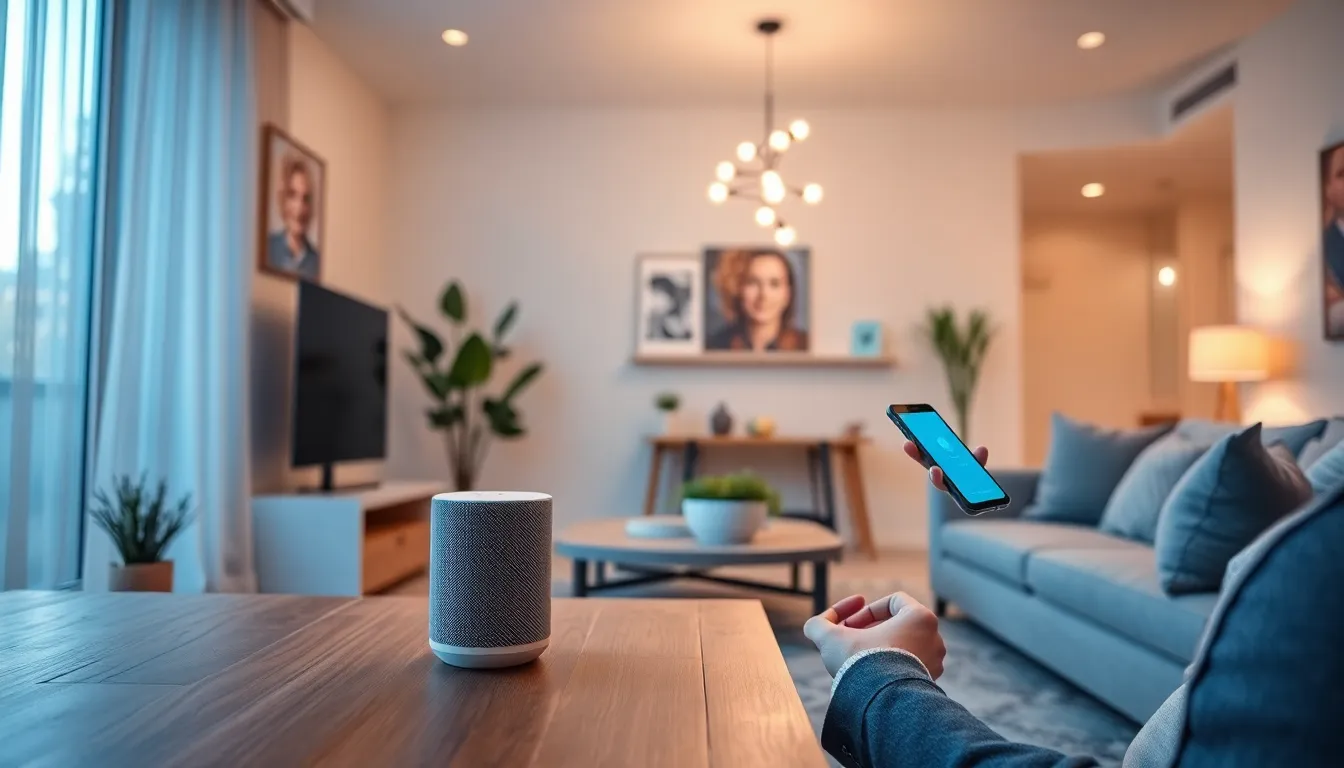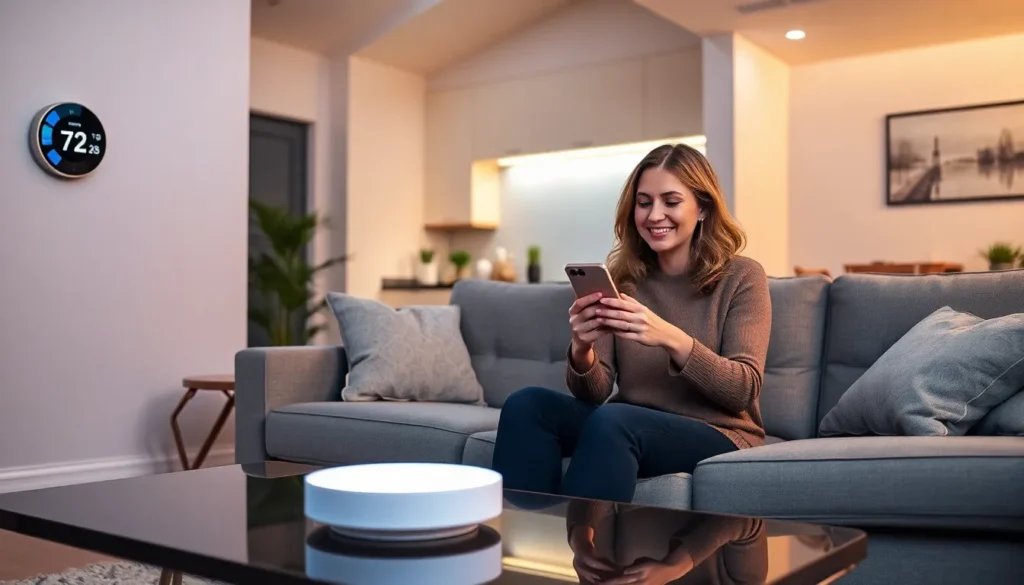Table of Contents
ToggleImagine a world where your coffee brews itself while you snooze, and your lights know when you’re feeling moody. Welcome to the realm of smart home tech, where gadgets are smarter than your average bear and life gets a whole lot easier—no magic wand required.
Overview of Smart Home Tech
Smart home technology encompasses a range of devices designed to enhance daily living. These devices connect to the internet and interact with one another, offering seamless automation. Home security systems represent one application, allowing users to monitor property through cameras and sensors.
Energy-efficient devices make up another category, with smart thermostats and lighting systems adjusting settings based on user preferences. The integration of voice assistants adds convenience, enabling users to control various systems hands-free. Appliances like smart refrigerators and ovens can offer notifications about expiration dates or cooking time estimates.
More detailed customization is possible through mobile apps, allowing users to monitor and control devices remotely. For example, homeowners can alter thermostat settings while away from home, ensuring energy savings. Enhanced convenience comes with scheduling capabilities, as users can set routines for lights, locks, and appliances.
Industry advancements continue shaping smart home tech, with new products emerging weekly. Devices like smart speakers enhance entertainment options, letting users music stream and control home systems simultaneously. Interoperability among brands improves through emerging standards, allowing different products to work together effectively.
Investments in security and privacy measures grow alongside technology to ensure users feel safe. Companies focus on building trust with transparent data practices and strong encryption. These developments contribute to the growing acceptance of smart home technology in modern households.
Benefits of Smart Home Tech

Smart home technology offers numerous benefits that enhance daily living through automation and connectivity. Users experience a seamless integration of devices, making life more efficient and secure.
Enhanced Convenience
Smart home tech significantly improves daily convenience. Devices allow for seamless control of lighting, heating, and appliances via mobile apps or voice commands. Homeowners can schedule routines, like having coffee brewed in the morning or lights dimmed in the evening, with ease. This technology provides instant access to home management, simplifying tasks and minimizing manual effort. Furthermore, smart appliances send alerts about important updates, such as when food is about to spoil. The cumulative effect of these functionalities streamlines mundane daily activities.
Improved Security
Improved security stands out as a key benefit of smart home technology. Advanced security systems include cameras and motion detectors that provide real-time alerts to users. These systems enable homeowners to monitor their property from anywhere using smartphones. Alerts about suspicious activity or breaches improve response times, offering peace of mind. Additionally, smart door locks allow for keyless entry, increasing convenience for residents while ensuring safety. Enhanced security features build trust in smart home technology, making homes safer for families.
Popular Smart Home Devices
Smart home devices offer various functionalities that enhance comfort, security, and energy efficiency. Many homeowners are increasingly adopting these advanced technologies.
Smart Lighting
Smart lighting systems allow effortless control over illumination throughout any space. Wireless app-controlled bulbs offer customizable brightness and color options, enhancing a room’s ambiance. Users set schedules for lights to turn on or off, which promotes energy conservation. Voice-activated features enable hands-free operation, making life even more convenient. Many smart lighting solutions also integrate with other smart devices for a comprehensive home automation experience.
Smart Thermostats
Smart thermostats contribute significantly to energy savings and comfort. Users can monitor and adjust heating and cooling remotely via mobile apps, ensuring optimal conditions. Advanced models learn user habits, adjusting temperatures automatically based on occupancy patterns. Data analytics from smart thermostats identify energy usage trends, helping homeowners reduce costs. Integration with other smart devices allows coordinated responses to environmental changes, further enhancing energy efficiency.
Smart Security Systems
Smart security systems enhance home safety through advanced monitoring and automation. Users can access real-time surveillance footage from anywhere via mobile applications. Motion detectors and door sensors provide immediate alerts, ensuring prompt notifications of unusual activity. Keyless entry features offer convenience while improving security. Many systems include integration with smart lighting and cameras, allowing users to create customized security protocols based on individual preferences.
Integration and Compatibility
Integration and compatibility are essential components of smart home technology. They enable devices from various manufacturers to work together seamlessly.
Smart Home Hubs
Smart home hubs serve as command centers for various devices. These hubs connect smart thermostats, lights, and security systems, facilitating unified control. Popular choices like Amazon Echo, Google Nest, and Samsung SmartThings enhance compatibility across brands. Users find it easy to automate routines by linking devices through a hub. Reliable connections maintain efficient communication, ensuring devices respond promptly to commands.
Voice Assistants
Voice assistants streamline control with simple voice commands. Devices like Amazon Alexa, Google Assistant, and Apple Siri support a wide array of smart home products. Users enjoy hands-free convenience, issuing commands for lighting, temperature adjustments, or security checks. Compatibility with numerous brands and devices broadens functionality. Voice assistants learn preferences, adapting to individual needs over time. With this technology, managing a smart home becomes intuitive and accessible, enhancing the overall experience.
Future Trends in Smart Home Tech
Emerging technologies will further transform smart home systems in the coming years. Enhanced artificial intelligence capabilities make devices more intuitive, allowing for personalized experiences based on user habits. Key innovations include advanced machine learning algorithms that analyze data to optimize energy efficiency and user comfort.
Increased focus on security continues to drive development. Biometric authentication methods, like facial recognition, may become standard in smart locks and surveillance systems. These measures improve security while providing unprecedented access control for homeowners.
Home automation integration with renewable energy sources is on the rise. Devices can monitor solar energy production and adjust consumption accordingly, reducing utility costs. Smart home systems will connect to electric vehicle chargers, allowing for coordinated energy usage during high-demand periods.
Interoperability among devices remains a priority. Companies are developing universal standards to ensure seamless communication between products from different manufacturers. These advancements simplify user experience, making it easier for consumers to manage diverse smart tech.
Voice control popularity is expected to soar. As voice assistants improve their understanding of natural language, users can issue more complex commands, enhancing functionality. This trend will lead to greater accessibility for individuals with disabilities, as voice commands can fully operate various smart devices.
Data privacy concerns shape the future landscape of smart home tech. Manufacturers are investing in robust encryption methods and transparent user agreements, helping users feel secure about data handling. Ensuring privacy may become essential for acceptance among technology-savvy consumers.
Sustainability initiatives influence product design and functionality. Smart devices will emphasize energy conservation, contributing to a more eco-friendly lifestyle. Innovations such as energy-efficient appliances and water-saving fixtures are likely to gain traction as users prioritize environmental conservation.
Smart home technology is revolutionizing the way people interact with their living spaces. With the integration of advanced devices and systems, managing daily tasks has never been easier. The commitment to security, energy efficiency, and user-friendly interfaces ensures that these innovations not only enhance convenience but also provide peace of mind.
As the industry continues to evolve, users can expect even greater interoperability and personalized experiences. Embracing smart home technology allows individuals to create a more efficient and secure environment tailored to their unique lifestyles. The future holds exciting possibilities, making now the perfect time to explore the benefits of a connected home.







